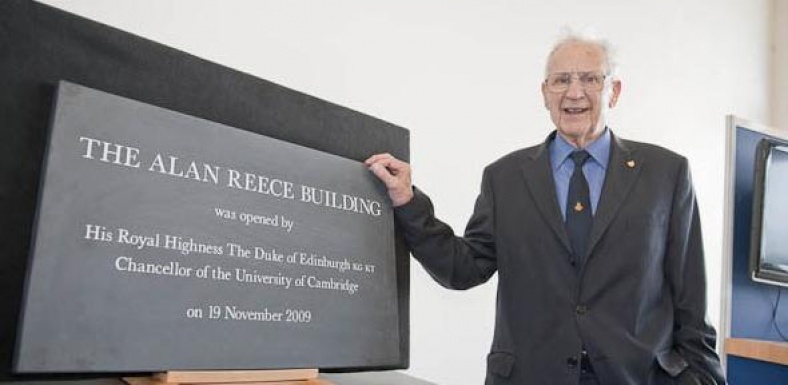
Reece, Dr Alan Richard
1927-2012
Engineer and Entrepreneur
Dr Alan Reece was the founder of the privately owned Reece group of engineering companies, now headquartered at the Armstrong works on Scotswood Road in Newcastle, the appropriately named manufacturing complex symbolically linking Newcastle’s proud engineering past to its present achievements and future ambitions. The chief executive of the group is John Reece, Alan’s son, who shares his father’s passion for innovative engineering.
Alan Reece combined an intellectually enquiring mind with a deep sense of practical purpose. Born in London, he came to Newcastle to study mechanical engineering at King’s College, a division of Durham University that became Newcastle University in 1962. He graduated with a BSc in 1947 and an MSc in Agricultural Engineering in 1950. He was awarded his PhD in 1964. To gain practical experience he worked in industry at Vickers-Armstrong, Ford and International Harvester. He resumed his academic career in 1956, progressing from Lecturer, to Senior Lecturer, to Reader before returning to the industry in 1984 to grow his spin-out company, Soil Machine Dynamics (SMD), founded in 1983.
It was then, aged 56, that Alan Reece began his entrepreneurial career in earnest. SMD applied agricultural ploughing technology to the task of laying cables and pipelines beneath the seabed, safe from damage by ocean-going trawlers. Using super-sized equipment designed by Alan and his team, laying undersea pipelines and cables became not only safer but also cheaper. Large contracts resulted, and the business went from strength to strength. SMD developed a series of innovative subsea trenching vehicles and, by 2000, the company had an annual turnover of £60m. It then acquired Pearson Engineering from the liquidators and refocused the business on defence contracting. Pearson won the Queen’s Award for Enterprise in 2012. The Reece group, now led by John, had emerged as a major force in the engineering industry, diversifying selectively through acquisitions. It acquired the Armstrong Works in 2012 to create the capacity for future expansion and after a £20 million refurbishment occupied the premises in 2014.
Entrepreneurial success on a grand scale brought grand rewards. At the time of his death in 2012, Alan Reece had amassed a fortune estimated at £200 million. He was intent on using the money wisely for the benefit of the North East and the UK as a whole. In 2007, he established the Reece Foundation “to promote manufacturing and support education with an emphasis in the North East particularly relating to engineering, maths and physics.” The Foundation makes grants to support engineering projects in schools and provides talented pupils with opportunities to attend high profile lectures and gain industrial experience. Reece scholarships are awarded to pupils taking technical subjects in schools. At the end of December 2016, the Foundation had net assets of £25 million, having expended £6.14 million on charitable activities in the previous five years. Alan Reece’s largest single charitable donation was to £5 million to support the Institute for Manufacturing at Cambridge University where the Institute’s new building in West Cambridge, opened in 2009, is named in his honour. In 2016, the Foundation made a grant of £200,000 to the John Muir Trust which maintains natural habitats in Scotland, reflecting Alan’s passion for walking and mountain biking. He was said to have climbed over 200 Munros in his lifetime.